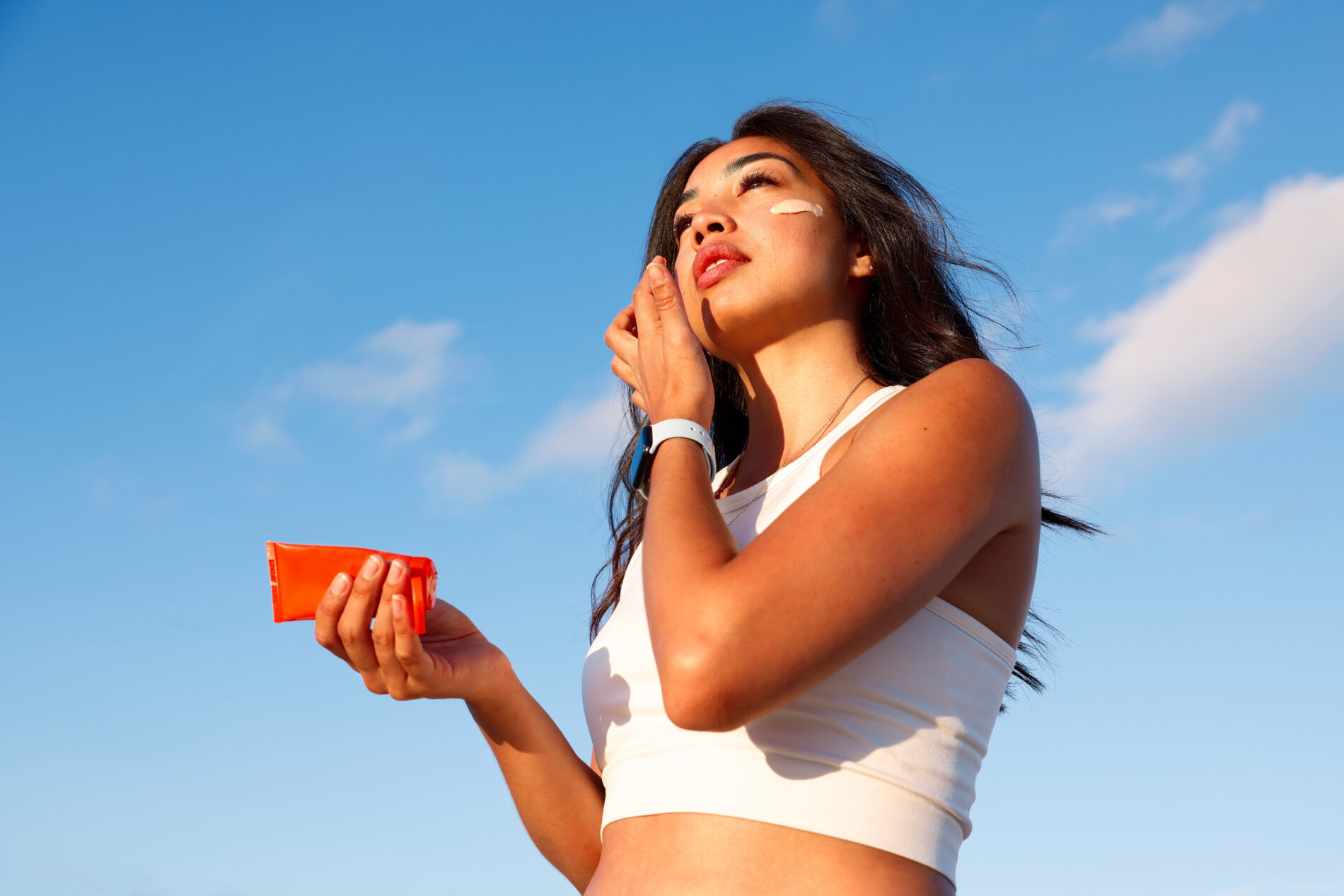
Thankfully, we all get the opportunity to bask in the sunlight, so that means we all need sunscreen or sunblock. No matter our age, ethnicity, skin tone, or skin type, the sun’s ultraviolet rays are extremely powerful. Achieving sun protection for specific skin types and concerns is important as temperatures rise and sunlight becomes more intense.
Although we get lots of endorphins (happy hormones) and nutrients, such as Vitamin D from the sun, we have to be mindful to avoid overexposure. This is where sun protection and SPF come into play, which is arguably the most important step of your skincare routine.
Being out in the hot sun without any protection for your skin can cause UV damage resulting in sunburn, dark spots, wrinkles, and other signs of premature aging. Most importantly, doctors and biologists recommend we apply sunblock daily to help prevent chances of more serious issues, such as skin cancer.
As vital as it is to apply sunscreen, applying the right kind is what’s most important. However, finding the one that’s best for you can feel a little overwhelming. The fact of the matter is all sunscreens are not created equal. Don’t sweat it! We’re here to demystify the wonders of sunblock and help you identify which one will work best for you.
When Searching for Sunscreen, Start With SPF and UV
SPF
Sun protection and SPF go hand in hand. In fact, sun protection factor, also known as SPF, measures the level of protection from the sun’s ultraviolet rays. That’s why, when shopping for sunscreen, it’s imperative to consider your skin type and skin tone, which play vital roles in susceptibility to sunburn. Generally speaking, people commonly choose a sunscreen with an SPF of at least 30, as it offers considerable protection for short times spent in the sun.
On the other hand, if you have fair skin with less melanin, which is our molecular makeup responsible for hair, eye, and skin color, SPF 30 won’t be effective enough—you’re urged to opt for SPF 50 or higher. Doing so ensures your skin’s utmost health and safety.
UV
There are two kinds of ultraviolet radiation, or UV rays, that reach the earth—UVB and UVA. Ever wondered what “broad spectrum protection” means? It indicates that the sunscreen is formulated to shield your skin from both kinds of ultraviolet rays, since when they’re combined, they can cause severe damage.
UVB rays are packed with more energy and directly affect the skin’s outer layer, which is the epidermis. UVB can come from artificial sources as well, such as tanning beds and lasers. Their level of strength is why they play a significant role in irreversible harm such as melanoma, a common skin cancer. Conversely, UVA rays penetrate past the epidermis, and cause premature aging, like wrinkles, also known as photoaging, and hyperpigmentation, which is when the skin becomes much darker.
Mineral VS Chemical Sunscreen
Certain ingredients in sun protection and SPF tell you whether it’s a mineral or chemical formula. Mineral sunscreen, which is physical sunscreen, has zinc or titanium dioxide. These both help reflect UV rays, instead of absorbing them, as the product sits on top of the skin, creating a protective barrier between your epidermis and the sunlight. Mineral sunscreen is ideal for kids, acne-prone skin, or those with skin sensitivities.
One downside to mineral or physical sunscreen is the white cast it may leave, which is even more noticeable on those with a deeper skin complexion. Luckily, there are tinted sunscreens and SPF tinted moisturizers to choose from as well, which provide a smooth and even appearance as well as protect from UV rays.
If your time out in the sun requires water and sweat resistance, and if your skin type can handle it, chemical sunscreen is a viable option. Be mindful, this isn’t the recommended sunscreen for sensitive skin. These lightweight formulas contain organic or carbon-based compounds that seep into the skin, converting UV rays to heat before being released from the skin’s surface. This process happens incredibly fast, preventing UVA and UVB from ruining the dermis and epidermis.
Remember to Re-Apply!
Slathering on sunscreen is not a one-and-done thing, especially if you’re spending all day outside doing yard work, or swimming at the beach. Sunscreen’s effectiveness declines over time, not only due to sun exposure, but also sweat, water, and friction. Since each of these factors among others reduces its efficacy, or ability to protect, re-applying sunblock every couple of hours while you’re outside continuously keeps your skin safe from sun damage.
Our Facials Are Incomplete Without SPF
Taking care of your skin requires daily protection from all the elements, including stress, hormonal changes, environmental factors, and, you guessed it sunlight. Although the sun’s radiance is appreciated, it’s up to us to keep our skin looking luminous and healthy as well. Maintaining fabulous skin takes lots of effort and discipline. Your girlfriends at The Only Facial are here to help make skincare much easier and more indulgent.
Our thorough services cover everything from A to Z. So, rest assured, when you book a facial with our professionals, it always ends with SPF, so when you step outside after your appointment, you don’t have to wonder if your skin’s safe from the sun. Schedule your visit today and help your skin gleam in time for spring.